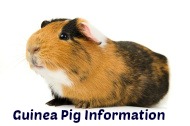|
|
|
|
wsp_rte_replace_marker?

|
Habitat - Guinea pigs need a clean roomy cage, with a covered area or an igloo to hide in. A commercially available cage with a plastic bottom and a removable wire top is a good choice. Avoid aspen or pine when choosing bedding, because they can contain harmful oils. Safer alternatives include recycled paper bedding such as Care Fresh. Your guinea pig should exercise outside of its cage with supervision on a daily basis. If not, he may need to be housed in a substantially larger cage. Make sure wires or other chewable items are out of your pig’s reach. Males and females may be housed together if at least one of them has been neutered to prevent pregnancy.
Diet - Guinea Pigs should have unlimited access to timothy, orchard, oat, or botanical hay. Guinea pigs 6 months and under should be fed alfalfa hay and young guinea pig pellets. Avoid feeding adult guinea pigs alfalfa hay except as an occasional treat as it is too rich in minerals and calories. You should also provide guinea pig specific pellets without seeds or colored pieces and fresh fruit/veggies/greens daily. Oxbow brand pellet is a good non-alfalfa food source. Guinea pigs are unable to make vitamin C, so they need to be given vitamin C to avoid serious health problems. Pellets made for guinea pigs include vitamin C, but the vitamin breaks down quickly and becomes ineffective. Your pig should be given vitamin C-rich vegetables. If needed, you can offer your pig commercial vitamin C. Discuss with your veterinarian if this is appropriate for your pig. Socialization - Most guinea pigs will approach a hand introduced into their cage and can be easily scooped into the palm of the hand. Cup one hand under the rump while cradling the midsection with the other hand. A two-handed hold is always recommended. Guinea pigs unaccustomed to being handled may jump and run, but rarely turn aggressive. Veterinary Care - Guinea pigs need periodic nail trims and annual/biannual vet exams to check teeth, stool, and general health status. It is best to spay females to prevent mammary and reproductive tumors, as well as unwanted pregnancies. Neutering males may minimize retention of feces in rectal area (and avoid bacteria build up.) Guinea pigs exhibit gut stasis or lack of intestinal movement by eating less and producing fewer feces. This needs immediate veterinary attention. Guinea pigs can also have mites, ringworm, or allergies. Some Guinea pigs can get bladder infections or stones. Old age problems include kidney disease, arthritis and neoplasia. Our staff would gladly speak to you if you have any further questions about your guinea pig. |



